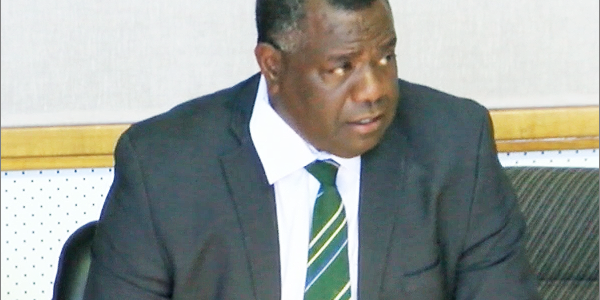The Minister for Mines, Energy and Rural Electrification (MMERE), Hon. Bradley Tovosia has delivered the Solomon Islands country statement through a recorded video at the 4th Asia-Pacific Water Summit which took place at Kumamoto, Japan over the weekend.
Hon. Tovosia used the occasion to highlight water issues affecting Solomon Islands and also updated the Summit on the Solomon Islands Government policies on water and issues associated with it.
According Tovosia, overall access to improved drinking water supplies in the Solomon Islands, as of 2015, was generally 76% to 90%. Urban areas of the Solomon Islands include coverage of 91% to 100%, while rural areas have coverage of 76% to 90%. Overall access to improve sanitation as of 2015 is between 26% and 50%. Urban areas of the Solomon Islands include coverage of 76% to 90%, while rural areas have coverage of 0% to 25%.
The Solomon Islands has a relatively well defined ministerial and sectoral roles in the provision of improved drinking water supplies and sanitation, but with many islands spread over such a large region, high transportation costs, few roads on many islands, challenges to maintenance such as providing training and spare parts and increasing population—the challenges of clean water supply and sanitation remains.
Minister Tovosia informed the Summit that the current Government, under its key policy objectives recognizes the importance of “Providing an Enabling environment to stimulate economic growth in the rural areas and ensuring the sustainable utilization and conservation of natural resources, including water, its protection and combating the adverse effects of climate change respectively.
These key policy objectives are featured in the Solomon Islands National Development Strategy (NDS) 2016-2035.
The Ministry is responsible for assessing, administering, managing and planning water resources in the Solomon Islands. It does this in various ways, including addressing existing legislation, ministerial policies and plans. This results in assessing both ground and surface water availability.
Similarly, the Solomon Islands Water Authority (SIWA) is a state-owned enterprise that is owned by the Government of the Solomon Islands. It is responsible for providing water and wastewater conveyance services in urban areas of the country (Honiara on the island of Guadalcanal; Auki on the island of Malaita; Noro on the island of New Georgia, and Tulagi on the island of Tulagi).
To address the water supply challenges in the urban areas the Solomon Islands Government and SIWA is currently implementing the Urban Water Supply and Sanitation Sector Project (UWSSSP) as part of the SIWA Five Year Plan and 30 Year Strategic Plans as the Road Map for the Government and SIWA in water supply and wastewater development.
Rural water supply within the Solomon Islands is the responsibility of the Ministry of Health and Medical Services, under the Solomon Islands Rural Water Supply, Sanitation and Hygiene (RWASH) program through the RWASH Policy and Strategic Plan.
Solomon Islands is a signatory to the Sustainable Development Goals (SDG), particularly on water and sanitation for all by 2030. SDG Goal Indicator 6 concerns water targets to achieve access to adequate and equitable sanitation and hygiene for all and end open defecation, paying special attention to the needs of women and girls and those in vulnerable situations”.
“Solomon Islands is experiencing the impact of the COVID-19 pandemic across multiple sectors. The impacts on the key sectors, especially water, sanitation, and associated sectors such as agriculture are yet to be fully understood however, it is well noted that impacts of COVID-19 on water resource contributed to limitations in the functioning of agencies responsible for management of water resource and sanitation,” Tovosia said.
He added that the COVID-19 pandemic in Solomon Islands have highlighted the need to improve water and food security in the country.
“The impacts of COVID-19 pandemic have caused many challenges in the water and sanitation sector, and these challenges have also made the response to the COVID-19 infections more complex, affecting vulnerable populations unequally”.
“The need for improvements through strengthening water resource management and development is very important to identify the extent of impacts and contributing factors for greater understanding and implementation of policies to manage the water resource sector during such pandemics in the future,” Tovosia said.
In order to improve the livelihoods of the people of Solomon Islands, the NDS called for the development of sector plans.
For water and sanitation, the Solomon Islands National Water Resource and Sanitation (WATSAN) Policy was formulated to provide government leadership in the water and sanitation sector, and includes the goals of protecting water sources, identifying national priority areas, providing clear policy goals and objectives and assigning agency responsibilities. It also provide strategies for adapting to global climate change.
Tovosia expressed confidence that the 4th APWS will provide Governments with appropriate directions towards policy decisions to accelerate actions to increase resilient, inclusiveness, and sustainable society by resolving various water-related issues in the recovery from COVID-19 pandemic in the region, and encourage further collaborations to promote quality growth for countries in the region.
– GCU









